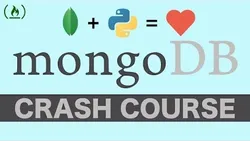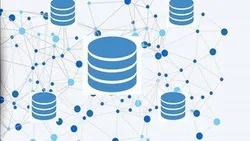
MongoDB with Python Crash Course - Tutorial for Beginners 
This MongoDB with Python Crash Course is a great introduction to MongoDB and Python for beginners. It covers topics such as how document databases work, who uses MongoDB, data modeling, integration database, getting demo code, how ODMs work, and more. It also provides demos on registering connections, defining mongoengine entities, creating a new account, managing data, booking a cage, and more. Additionally, it covers concepts such as inserting documents, queries, querying subdocuments, query using operators, updating via whole documents, and updating via in-place operators. This course is a great way to learn the basics of MongoDB and Python and is suitable for beginners. ▼
ADVERTISEMENT
Course Feature
![]() Cost:
Cost:
Free
![]() Provider:
Provider:
freeCodeCamp
![]() Certificate:
Certificate:
Paid Certification
![]() Language:
Language:
English
![]() Start Date:
Start Date:
On-Demand
Course Overview
❗The content presented here is sourced directly from freeCodeCamp platform. For comprehensive course details, including enrollment information, simply click on the 'Go to class' link on our website.
Updated in [February 21st, 2023]
) Welcome.
) Intro to MongoDB.
) How do document DBs work?.
) Who uses MongoDB.
) Data modeling.
) Modeling guidelines.
) Integration database.
) Getting demo code.
) How ODMs work?.
) Introduction to mongoengine.
) Demo: Registering connections with MongoEngine.
) Concept: Registering connections.
) Demo: Defining mongoengine entities (classes).
) Concept: mongoengine entities.
) Demo: Create a new account.
) Demo: Robo 3T for viewing and managing data.
) Demo: Login.
) Demo: Register a cage.
) Demo: Add a bookable time as a host.
) Demo: Managing your snakes as a guest.
) Demo: Book a cage as a guest.
) Demo: View your bookings as guest.
) Demo: View bookings as host.
) Concept: Inserting documents.
) Concept: Queries.
) Concept: Querying subdocuments with mongoengine.
) Concept: Query using operators.
) Concept: Updating via whole documents.
) Concept: Updating via in-place operators.
) Conclusion .
(Please note that we obtained the following content based on information that users may want to know, such as skills, applicable scenarios, future development, etc., combined with AI tools, and have been manually reviewed)
1. Understanding MongoDB: Learners can gain a comprehensive understanding of MongoDB, including its features, advantages, and how it works. They can also learn about the different types of databases and how to integrate them with MongoDB.
2. Data Modeling: Learners can learn about data modeling and the guidelines for creating a successful data model. They can also learn how to use MongoEngine to define entities and create a new account.
3. Managing Data: Learners can learn how to use Robo 3T to view and manage data. They can also learn how to use MongoEngine to insert documents, query data, and update documents.
4. Demo Projects: Learners can gain hands-on experience by completing demo projects such as registering connections, creating a new account, managing snakes, and booking a cage.
5. Conclusion: Learners can gain a comprehensive understanding of MongoDB and its features, as well as how to use MongoEngine to create and manage data. They can also gain hands-on experience by completing demo projects.
[Applications]
The application of this course can be seen in the development of web applications that use MongoDB as the database. It can also be used to create applications that require data modeling and integration with other databases. Additionally, the course provides an introduction to MongoEngine, which is a Python library for working with MongoDB. With this knowledge, developers can create applications that use MongoDB with Python. Finally, the course provides an overview of how to use MongoDB with Python, including how to insert documents, query data, and update documents.
[Career Paths]
1. MongoDB Developer: MongoDB Developers are responsible for designing, developing, and maintaining MongoDB databases. They must have a strong understanding of MongoDB's features and capabilities, as well as the ability to write efficient queries and optimize performance. Developing trends for MongoDB Developers include the use of cloud-based solutions, such as MongoDB Atlas, and the use of NoSQL databases for big data applications.
2. MongoDB Administrator: MongoDB Administrators are responsible for managing and maintaining MongoDB databases. They must have a strong understanding of MongoDB's features and capabilities, as well as the ability to troubleshoot and optimize performance. Developing trends for MongoDB Administrators include the use of cloud-based solutions, such as MongoDB Atlas, and the use of NoSQL databases for big data applications.
3. MongoDB Consultant: MongoDB Consultants are responsible for providing advice and guidance to clients on the best way to use MongoDB. They must have a strong understanding of MongoDB's features and capabilities, as well as the ability to provide advice on how to optimize performance and troubleshoot issues. Developing trends for MongoDB Consultants include the use of cloud-based solutions, such as MongoDB Atlas, and the use of NoSQL databases for big data applications.
4. MongoDB Data Analyst: MongoDB Data Analysts are responsible for analyzing data stored in MongoDB databases. They must have a strong understanding of MongoDB's features and capabilities, as well as the ability to write efficient queries and optimize performance. Developing trends for MongoDB Data Analysts include the use of cloud-based solutions, such as MongoDB Atlas, and the use of NoSQL databases for big data applications.
[Education Paths]
1. Bachelor of Science in Computer Science: This degree path focuses on the fundamentals of computer science, such as programming, software engineering, and computer architecture. It also covers topics such as artificial intelligence, data structures, and algorithms. With the increasing demand for data-driven solutions, this degree path is becoming increasingly popular.
2. Master of Science in Data Science: This degree path focuses on the application of data science techniques to solve real-world problems. It covers topics such as machine learning, data mining, and natural language processing. It also covers topics such as data visualization, predictive analytics, and big data. This degree path is becoming increasingly popular as businesses are looking for ways to leverage data to gain insights and make better decisions.
3. Master of Science in Artificial Intelligence: This degree path focuses on the development of intelligent systems that can learn and adapt to their environment. It covers topics such as machine learning, natural language processing, and computer vision. It also covers topics such as robotics, game theory, and neural networks. This degree path is becoming increasingly popular as businesses are looking for ways to automate processes and make decisions more efficiently.
4. Doctor of Philosophy in Computer Science: This degree path focuses on advanced topics in computer science, such as artificial intelligence, machine learning, and natural language processing. It also covers topics such as computer vision, robotics, and game theory. This degree path is becoming increasingly popular as businesses are looking for ways to develop more sophisticated solutions to complex problems.
Course Provider

Provider freeCodeCamp's Stats at AZClass
Discussion and Reviews
0.0 (Based on 0 reviews)
Explore Similar Online Courses

Drugs for Heart Failure

Ender 7 3d Printer Review Its fast but how fast? How is the quality?

Python for Informatics: Exploring Information

Social Network Analysis

Introduction to Systematic Review and Meta-Analysis

The Analytics Edge

DCO042 - Python For Informatics

Causal Diagrams: Draw Your Assumptions Before Your Conclusions

Whole genome sequencing of bacterial genomes - tools and applications

Searching for Text in MongoDB

Learning MongoDB - NoSQL database


Start your review of MongoDB with Python Crash Course - Tutorial for Beginners